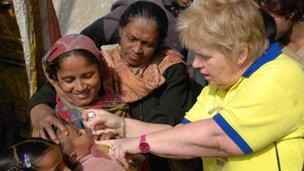India no longer polio endemic says WHO
- Published
- comments

India has not had a polio case for more than a year due to effective immunisation campaigns
India has been officially removed from the list of polio endemic countries. The announcement was made in Delhi at a polio summit. It was a decision that was widely trailed in my coverage of polio from India last week and confirms the remarkable achievement the country has had in tackling the disease.
The Prime Minister of India, Dr Manmohan Singh said "It is a matter of satisfaction that we have completed one year without any single new case of polio being reported from anywhere in the country. This gives us hope that we can finally eradicate polio not only from India but from the face of the entire mother earth. The success of our efforts shows that teamwork pays".
India will need to go another two years without a case of the disease before it is formally regarded as polio-free. It leaves three countries - Pakistan, Afghanistan and Nigeria as polio endemic - which means the virus is circulating freely and transmission of the disease has never been stopped.
Chad, DR Congo and Angola have also had cases of polio this year.
A group of international experts who are monitoring the efforts to eradicate polio have said the plan to stop global transmission by the end of 2012 remains "far off track". The team, headed by Sir Liam Donaldson, England's former Chief Medical Officer, has painted a stark picture of what will happen if eradication is not achieved soon. The Independent Monitoring Board, says: "An annual expenditure exceeding one billion US dollars is currently containing polio cases at low levels. If the eradication effort does not succeed soon, this funding will dry up. Country workers risk becoming increasingly fatigued. Failure would unleash the virus, paralyzing hundreds of thousands of children. This prospect seems unthinkable."
The report says the quality of the immunisation programme is too variable and says the people who carry it out are often overlooked. The report concludes: "Too many of these workers are underrated, rarely thanked, frequently criticised, often under-paid, poorly motivated, and weakly-skilled. Being an excellent vaccinator means being well-organised, a good communicator, and having the tenacity to track down every last child."
One issue that will have to be resolved is when to stop using the oral polio vaccine and switch to the injectable version. This is because the oral vaccine contains a weakened live form of the polio virus and this can, in rare cases, mutate sufficiently so that it can spread in the community, triggering outbreaks. This is known as circulating vaccine-derived poliovirus (cVDPV).
Most developed countries switched to the injectable, inactivated polio vaccine (IPV) some years ago. Unlike the oral vaccine this contains an inactivated or killed version of the virus.
But any risk from the oral vaccine is tiny compared to the wild virus. The WHO says that 10 billion doses of oral polio vaccine have been given to more than 2.5 billion children in the past decade. It estimates this has prevented at least 3.5 million polio cases. In the same period there have been 18 outbreaks of cVDPV resulting in 510 cases.
Although the type 2 wild polio virus has been eradicated, Nigeria has seen outbreaks of type 2 cVDPV. Dr Bruce Aylward Director of said: "If these vaccine-derived strains are not dealt with they can spread and cause paralysis like the wild virus. But they can be stopped in their tracks by immunisation."
The entire world would need to be polio-free for three years before the disease could be regarded as eradicated.
- Published20 February 2012
- Published20 February 2012